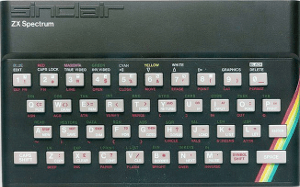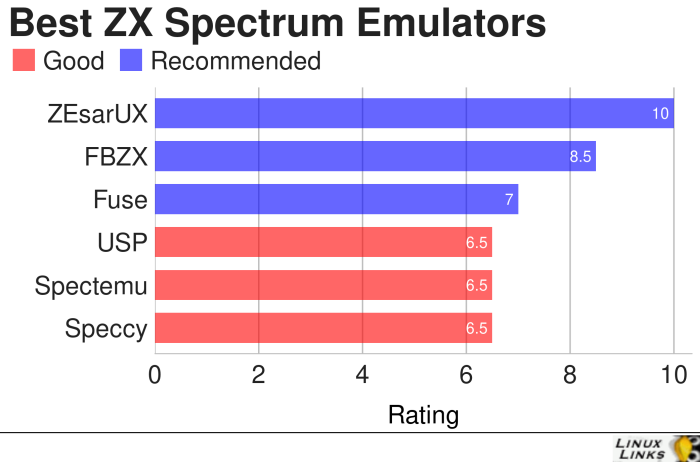Last Updated on April 22, 2022
 CPU: Z80A @ 3.5 MHz and equivalent.
CPU: Z80A @ 3.5 MHz and equivalent.
Sound: 1 channel 10 octave beeper on 16K and 48K models. 128K models had 3 channel sound via an AY-3-8912 chip.
Display: 256 x 192. 7 colours with 2 levels of brightness, plus black. Colour stored separately in a 32 x 24 grid overlay
Memory: 16K ROM & 16K, 48K or 128K RAM, depending on the model.
Software Media: Cassette.
In the spring of 1982, one of the most popular 8-bit home computers ever made was released to the UK market – the Sinclair ZX Spectrum. The basic model with 16KB of RAM cost £125, and the 48KB RAM model cost the princely sum of £175. Both came with a rubber keyboard. Later models offered proper keyboards with built in floppy disk drives.
The home computer offered colour graphics and sound at an affordable price. Yes, the limitations were stark. The graphics suffered from attribute clash (often known as colour clash) as only two colours could be displayed in any area of 8 x 8 pixels. The sound was also very limited, being generated through a beeper with a single channel. Yet, innovative programmers learned how to circumvent these issues, and this quirky piece of plastic took over a huge chunk of the home computing market selling more than 5 million units in the space of a decade. This was primarily because of the computer’s low cost. But it was also because writing for the ZX Spectrum was more about invention than design. Because there was so little space on the computer, games had to be fiendishly difficult to stop gamers completing them too quickly. The ZX Spectrum offered a lot both to gamers and programmers. With its limitations, programmers had the possibility of writing entire, innovative games on their own. It generated a whole breed of eccentric bedroom programmers. Over 24,000 titles were released for the Spectrum family. The majority of the titles were games, but office applications and other types of software were also available.
If you want to go back to the 1980s – to the wonderful era of 8-bit gaming, you can try one of the many ZX Spectrum emulators. All of the emulators featured in this article are free to download, with the majority released under an open source license.
To provide an insight into the quality of software that is available, we have compiled a list of 6 ZX Spectrum emulators. Hopefully, there will be something of interest for anyone who wishes to have some fun and reminisce about their misspent youth.
Here’s our verdict on the emulators.

Now, let’s explore the 6 emulators at hand. For each title we have compiled its own portal page, a full description with an in-depth analysis of its features, screenshots, together with links to relevant resources.
| ZX Spectrum Emulators | |
|---|---|
| ZEsarUX | ZX machines including all the Sinclair computers, and more |
| FBZX | ZX Spectrum emulator, using the FrameBuffer |
| Fuse | Free Unix Spectrum Emulator: Accurate 16K, 48K, 128K, +2, +2A and +3 |
| USP | Portable emulator based on UnrealSpeccy |
| Spectemu | 48K ZX Spectrum |
| Speccy | Runs on many different platforms (not open source) |
This page was last updated on 4 February 2019.
 Read our complete collection of recommended free and open source software. Our curated compilation covers all categories of software. Read our complete collection of recommended free and open source software. Our curated compilation covers all categories of software. Spotted a useful open source Linux program not covered on our site? Please let us know by completing this form. The software collection forms part of our series of informative articles for Linux enthusiasts. There are hundreds of in-depth reviews, open source alternatives to proprietary software from large corporations like Google, Microsoft, Apple, Adobe, IBM, Cisco, Oracle, and Autodesk. There are also fun things to try, hardware, free programming books and tutorials, and much more. |

And you don’t have to use the ‘Italian salad’ keyboard!
ZX Spectrum, the heady days of Crash magazine. That was probably the best home computing magazine ever devised.